Ken Hinkley addresses his Port Adelaide players during last Saturday’s win over Richmond. Photo: AFL MEDIA
Ken Hinkley is still standing.
Almost eight years since the Geelong club champion declared he was the “right man standing” to take on the rescue mission at the Port Adelaide Football Club, Hinkley is surviving against a long-standing trend for South Australians: They run “foreigners” out of town.
Hinkley on Saturday night coached Port Adelaide for the 170th time. No other Victorian – or West Australian or Taswegian – has come so close to the 200-game milestone (nor reached 150) as a coach in the 30 seasons of AFL football in Adelaide.
Hawthorn premiership hero Gary Ayres lasted 107 matches before he was told his time at Adelaide was up midway through the 2004 AFL season, allowing the Crows to usher in a South Australian favourite, Neil Craig.
Robert Shaw, the first “foreigner” to coach at AFL club in South Australia, was savaged in his second season with the Crows in 1995. Sadly, Phil Walsh died in 2015, just 12 games into his mission to create an “authentic football club” at Adelaide.
West Coast premiership player Don Pyke, the American-born West Australian, took Adelaide to the 2017 grand final – the only “outsider” to guide an SA-based AFL team to the premiership play-off.
But at the end of last season, after missing consecutive finals series, Pyke faced a humbling exit at the Crows while still holding two years on his contract.
As the club’s external review led by Hawthorn great Jason Dunstall was coming to the conclusion Pyke needed to be moved on, a leading West Coast official and confidant to Pyke reminded him: “They do run non-South Australians out of town.”
History proves the point.
In the pre-AFL days before Adelaide’s entry to the national league in 1991, only one Victorian and one West Australian (both of Richmond VFL fame) became premiership coaches in the SANFL – Mike Patterson at North Adelaide in 1971-1972 and Neil Balme at Norwood in 1982 and 1984.
The “Swamp Fox” Patterson also led North Adelaide to the Champions of Australia crown by beating VFL premier Carlton by one point at Adelaide Oval in 1972, and is hailed as the coach in the North Adelaide Football Club team of the (20th) century.
Balme holds the record – 13 seasons – for the longest stay (1980-1992) by an “outsider” in an SANFL coaching box.
And the list of Victorian greats who have tried to teach South Australians how to play winning football is loaded with grand names who failed – Essendon legend Dick Reynolds, Brownlow Medallist Noel Teasdale, Carlton hero John Nicholls, Collingwood 1958 premiership captain Murray Weideman and Hawthorn master Don Scott, who lasted just six games at South Adelaide in 1985.
The list of Victorians who had their coaching dreams wrecked in Adelaide is long, too, as emphasised by Merv Keane’s demise at Sturt in the 1980s at a club heavily set in its South Australian ways.
Hinkley’s tenure at Port Adelaide is more phenomenal considering the traditional South Australian club does not easily nor eagerly embrace outsiders. Hinkley is the first non-Port Adelaide player to coach the club’s senior team (that was promoted to the AFL in 1997) since Fos Williams arrived from local rival West Adelaide to create an extraordinary premiership dynasty at Alberton in 1950.
Hinkley also is the first post-war coach to survive after his Port Adelaide team missed consecutive final series in 2018 and last season.
Why?
Hinkley is, by the reckoning of Australian Football Hall of Fame legend Malcolm Blight the right man to stay standing at Port Adelaide because his upbringing in country Victoria and league football record at “provincial” Geelong is true to the Port Adelaide way.
“You need to look at Ken’s upbringing and past,” says Blight, who coached Hinkley at Geelong in the 1990s and hired him as an assistant during their short stint at St Kilda in 2001.
“Ken is a country boy (from Camperdown) who never settled to the Melbourne way of life when he went to play at Fitzroy (11 VFL games in 1987-88). But he was happy to come to Geelong – and Geelong is very similar to Adelaide.”
Hinkley, 53, was well adjusted to Port Adelaide by his long-standing playing record in a “small city” and at a traditional football club (121 VFL-AFL games at Geelong from 1989-1995).
“Absolutely,” said Blight, who with fellow South Australian Mark Williams is the only coach to have delivered the AFL trophy to an Adelaide-based club.
“The Port Adelaide way probably ingrained in Hinkley by his Geelong experiences – and he has embraced his new home as well as anyone I have seen come from interstate. He has the sense of Port Adelaide, the football club; Adelaide, the city; and South Australia. He is not Melbourne-centric.”
Hinkley’s eight seasons at Port Adelaide – that has had just four AFL coaches, Williams, John Cahill, Matthew Primus and Hinkley – is the second-longest tenure for any coach at either the Crows or Power (behind Williams, 12 seasons).
But it has not always been without heat under Hinkley’s seat.
Port Adelaide president David Koch has at times resembled his Hawthorn counterpart Jeff Kennett for keeping a coach on his toes with contentious public statements.
Having a totally supportive chief executive in Keith Thomas has helped Hinkley through the headlines created by Koch’s big statements, in particular those questioning Hinkley’s team selections for the 2017 home elimination final lost on the siren with the Luke Shuey free kick in double extra time against West Coast.
Some impatient Port Adelaide fans – accustomed to a flag every second year in the SANFL – have gone from wearing “In Ken We Trust” T-shirts to loading up talkback radio shows with calls for his sacking.
Hinkley tested the limit of some Port Adelaide traditionalists last year by endorsing co-captains – Tom Jonas and Ollie Wines – for the first time in the club’s history that dates to 1870. This move from tradition was reversed this season with Jonas as lone captain.
Critically, Hinkley has survived by publicly embracing rather than shunning Port Adelaide’s devotion to its past and its traditions.
He is far from the outsider demanding change to “advance” the football club to a new era, in a new league that differs considerably from the SANFL. He has respected the club’s past, even if it was built in a domestic competition that works to different limits when compared with the 18-team national AFL.
The co-captains decision is the classic moment that defines the exception to every rule. But from the day in October 2012 when he declared himself as the right man to lead Port Adelaide out of its darkest chapter, Hinkley has said, done and lived everything Port Adelaide has needed.
This includes those billboards and television commercials in the summer of 2012-2013 when Hinkley promised his Port Adelaide teams would – in contrast to previous offerings – “never, ever give up”. Port Adelaide had won just eight of 44 league games in the two seasons before Hinkley stood up at Alberton.
There have been three phases to the Hinkley era at Port Adelaide that will continue to next season, if only by a trigger in his current contract.
He simply needs to take the Power to the top-eight finals in October to have this become official. Although, having had Port Adelaide lead the competition for 20 consecutive weeks during the most-demanding season in Australian football history should reaffirm Hinkley is still the right man to be standing at Alberton.
The three Hinkley phases are –
HINKLEY 1.0 (2013-2014, 29-20 win-loss record; best finish, 2014 preliminary final loss to Hawthorn).
For context – and to refresh the memories – Port Adelaide was broke, had tarps on empty bays at Football Park while the fans had declared their disgust, the AFL and politicians were plotting to move the club’s licence to Tasmania or rebadged as Central Australia Power with games in Adelaide, Alice Springs and Darwin … and coaching candidates kept walking away from interviews.
While Hinkley seemed the last man standing for the job, he declared he was the “right man” – and did everything Port Adelaide needed on and off the field to restore the club’s image and competitive power.
Finals in his first season in 2013 and a phenomenal entry to Adelaide Oval in 2014 that ended with three finals – blitzing Richmond, the second-half comeback against Fremantle in Perth and the near-miss against eventual premier Hawthorn at the MCG.
Hinkley had put Port Adelaide back on its feet – and living up to its mission statement of existing “to win premierships”. He made Port Adelaide relevant again where it counted most for Port Adelaide diehards – on the scoreboard at weekends, not on financial balance sheets or spreadsheets at AFL House.
HINKLEY 2.0 (2015-2018, 48-41; best finish, 2017 elimination final loss to West Coast).
Port Adelaide thought it was close – and it went looking for missing pieces to the jigsaw puzzle in the trade market. Patrick Ryder, Charlie Dixon, Jack Watts, Tom Rockliff, Steven Motlop … and instead of rising into a premiership window, Port Adelaide became stuck in “no man’s” land around 10th position.
Season 2016 is the only year in which Hinkley has had more losses than wins (10-12); there is only one finals appearance (the epic 2017 elimination final with West Coast at Adelaide Oval) in these four seasons and, ultimately, Port Adelaide appeared as the “big tease” – a team you could not trust on your tipping sheet. It defined “inconsistency”.
Despite being heavily linked at the end of 2017 to Gold Coast – where he had been an assistant coach – Hinkley signed a contract extension at Port Adelaide. He also endured the loudest round of criticism, the external noise that has ended the rule of many non-South Australians in coaching jobs in Adelaide.
HINKLEY 3.0 (2019-today, 20-13; best ranking, top position since Round 1 this year).
Club before coach. Hinkley last year accepted the club’s strategy to revive its squad with list manager Jason Cripps aiming to build the league’s best under-22 squad.
Trading out stars Chad Wingard and Jared Polec to Hawthorn and North Melbourne is easier to digest by the quick rise of teenagers Zak Butters, Connor Rozee and Xavier Duursma. Investing in youth is not quite the dream script for a coach needing to take his team to finals to keep his job – but again Hinkley did what was best for Port Adelaide, particularly in the long term. He has played the kids rather than stockpiled them in the SANFL to rely on experienced talent.
Hinkley also at the start of this season embraced the club’s demand to stop talking about “making finals” and to lift the bar to “winning premierships”. In the pre-season, Hinkley declared: “I love this club and I love the history of this club – and this club’s history is premierships. So that is what we start out (this season) trying to do – winning the premiership in our 150th year. We re going to do everything we can to so that. So look out, we’re coming.”
Hinkley is defying more than a century of South Australians being reluctant to embrace Victorians and other outsiders. It is not always easy for Hinkley at a football club that is now 13 years from its previous AFL grand final, 16 years past its only AFL premiership party and amid its longest premiership drought in any major competition, 21 years since the last flag in the SANFL.
Why is Hinkley the exception to a long-running theme of South Australians running “foreigners” out of town to be the right man standing at Port Adelaide?
As Blight says, Hinkley has recognised his part at Port Adelaide – he has honoured the theme of club before individual. He is true to the mantra at Alberton that has no individual stand bigger than the club. He is – most importantly – a winning coach. The fans who questioned if Port Adelaide’s dip in 2016 came by Hinkley losing right-hand men Alan Richardson (to St Kilda) and Phil Walsh (to Adelaide) must now pay credit to Hinkley for putting Port Adelaide as the top of the ladder and with a playbook that has greater depth than in previous seasons.
Ken Hinkley is indeed the right man standing.
FOR the record: In the post-AFL era, SANFL success has become more noted with “outsiders” – Peter Rohde at Norwood in 1997, Alastair Clarkson at Central District in 2001, Josh Carr at North Adelaide in 2018 and Mark Stone ending a 34-year premiership drought at Glenelg last season.

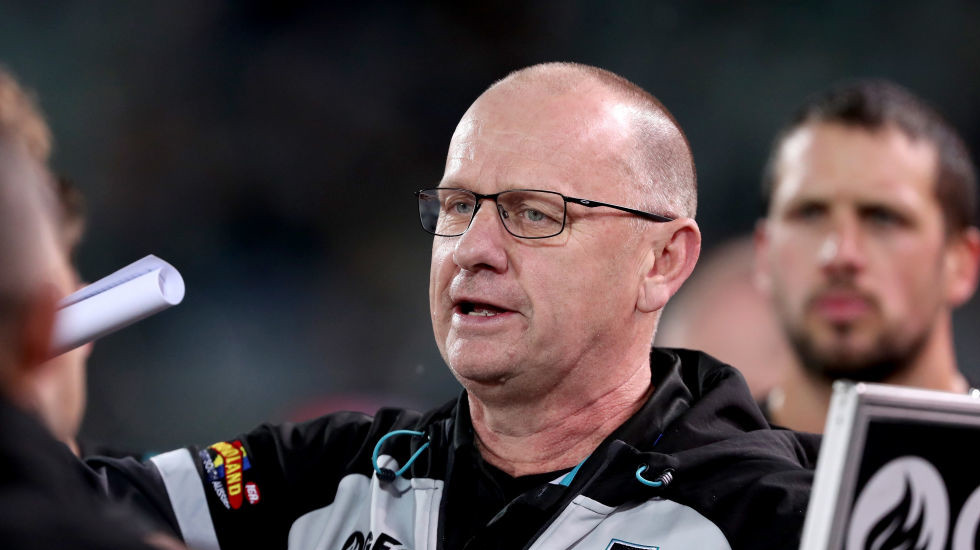

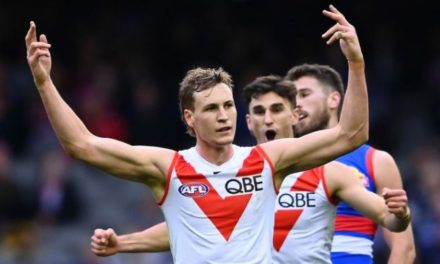
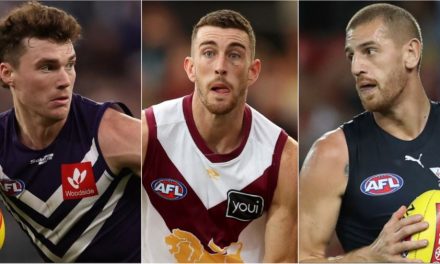
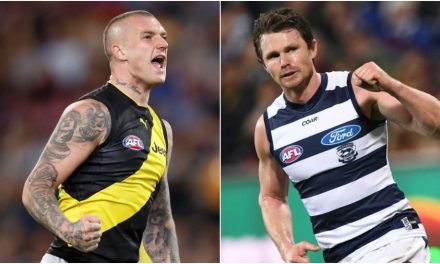
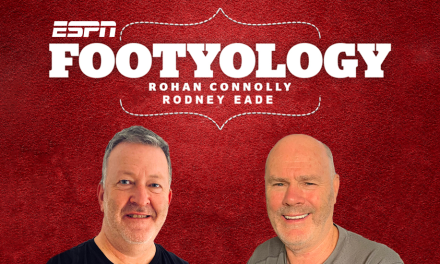






Michelangelo, you know full well that Port Adelaide has a rich tradition of embracing footballers and coaches from all over.
In fact, some of its most iconic, accomplished and beloved identities have hailed from beyond South Australia’s borders: Tim Evans, John Abley, Russell Johnston, Bomber Clifford and Matthew Primus among them, and more recently your Josh Carrs, Dom Cassisis, Jackson Trengoves, Robbie Grays and Travis Boaks.
Once you walk through the doors at Alberton, regardless of where you’re from, you’re Port Adelaide. But if you shirk a contest, give less than 100%, waste golden opportunities, or otherwise fail to live up to the club’s ethos, ‘We Exist To Win Premierships’, the drums will start beating for replacements who can.
Ergo, to portray criticism of Ken Hinkley’s marathon tenure of futility as being couched in ‘Kick-a-Vic’ xenophobia is painfully disingenuous. Port people have always been intolerant of losing and impatient for success, but squandering an entire decade is unacceptable.
The 2021 Prelim debacle (occurring after this article was penned, granted) was an embarrassing capitulation against an exhausted and vulnerable opponent that had no right to get within 5 goals of Port, such was the mountain of disadvantages they faced.
That crushing defeat, Port’s heaviest at home since the days of Primus, should’ve signalled the end of Hinkley’s reign, whether he hailed from Camperdown, Campbelltown or Turks & Caicos — it’s about time you were assessed his reign as the sports journalist you used to be, and not his sycophantic biographer.